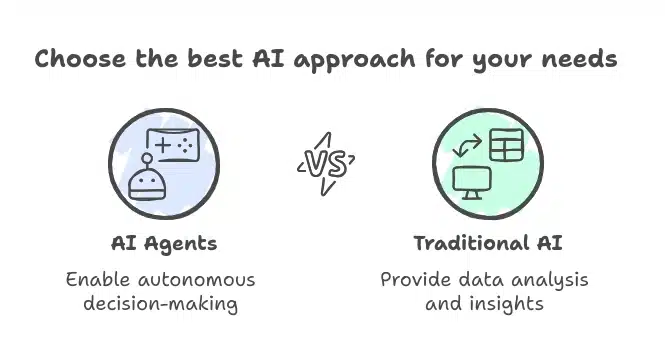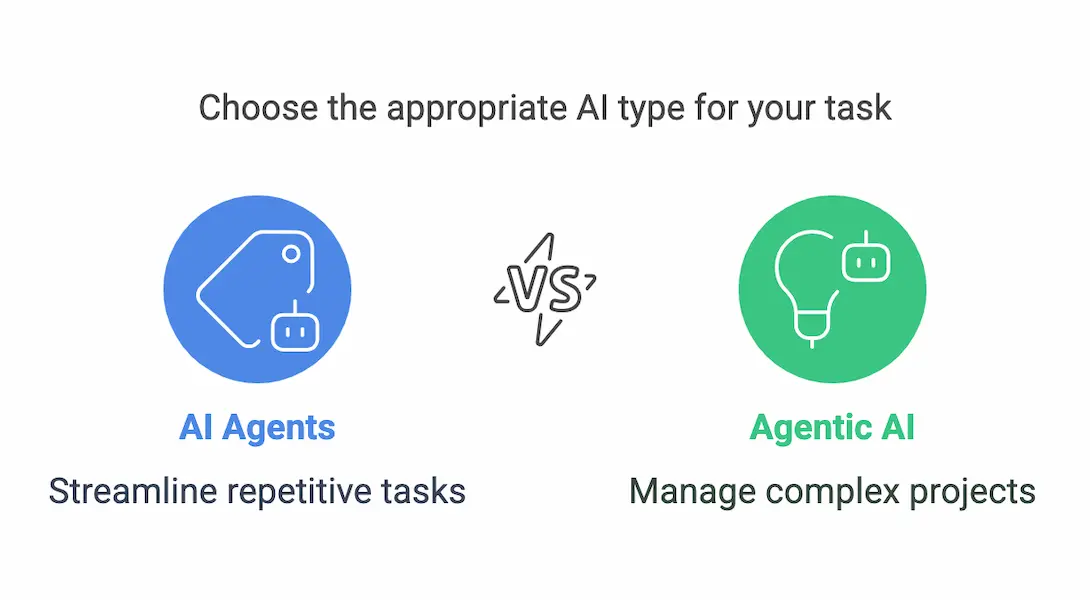With agentic AI making strides across industries, the JHU Applied Agentic AI program guarantees you won’t be left behind in this technological revolution.
Whether you are new to the field of Agentic AI or already have some experience, this degree is designed for both seasoned professionals and beginners.
In this blog, we’ll cover the challenges beginners and professionals face in Agentic AI and understand how the JHU Applied Agentic AI Program equips learners with the tools to harness AI’s potential.
Challenges Faced by Beginners in Agentic AI
- Lack of Programming Knowledge: Some of the program's concepts, such as Python, LLM, & GANs, can be challenging for beginner programmers, but they are critical to the development of AI models.
- Understanding Complex Theories: Agentic AI works with advanced models, as well as ethical issues, & deep learning frameworks, which can be confusing to newcomers.
- Limited Practical Experience: Learners struggle to put their skills into practice without practical experience in working with tools like Python, OpenAI, & Google Colab.
- Integrating AI in Real-World Problems: It can be challenging to implement AI to address business issues without a systematic guide, which is one of the major barriers to the real-world application of AI.
Challenges Faced by Professionals Looking to Upskill in Agentic AI
- Balancing Work and Learning:
A lack of time is a common issue faced by professionals seeking to upskill & keep pace with new AI technologies, given that work commitments can be demanding. - Keeping Up with Rapid Advancements:
The rapid development of AI makes its developments daunting, and the short time available to professionals is not sufficient to adopt new methods or tools. - Mastering Advanced Techniques:
Although practitioners will possess foundational knowledge, understanding an advanced model like an LLM or securing an AI deployment will necessarily require some attention that could be challenging to balance with a full-time job. - Applying AI in Business:
The task to be accomplished by professionals is not only to learn the technology but also to implement it in real-world case studies, so that, in a business context, they can develop AI solutions that answer organizational demands while considering ethical & security aspects.
How does the JHU Applied Agentic AI Program equip learners to Overcome Such Barriers?
The Certificate Program in Agentic AI is a 16-week online program that enables learners to design AI agents that perceive, reason, & act autonomously. Learners study the design of agents through a combination of theory-based & applied Python projects, including agent architecture, symbolic formulation, BDI, LLM integration, reinforcement learning, multi-agent systems, & human-agent collaboration, while also addressing ethical issues.
Certificate Program in Agentic AI
Learn the architecture of intelligent agentic systems. Build agents that perceive, plan, learn, and act using Python-based projects and cutting-edge agentic architectures.
1. Foundational Learning with Hands-on Experience
As a novice, it is crucial to establish a solid foundation in programming languages & Artificial Intelligence. The program aims to enable learners to develop confidence as they practice practically with key tools & technologies.
- Python and Google Colab:
Learners will be introduced to the Python language, object-oriented programming, & key data science libraries, which are the major languages in AI development. The program uses Google Colab, which provides an interactive platform where learners can develop code & execute models without the need to create elaborate configurations.
- Agentic AI and Key Concepts With Practical Learning:
Learners will delve into Agentic AI, exploring its key concepts, characteristics, & practical applications. They explore how agents operate, the role of autonomy & goal complexity, & the interplay between reasoning & behavior.
Through a mix of theory & hands-on learning, they will be able to compare traditional AI with agent-based systems & learn how to design agents for real-world applications.
The Python & Google Colab integration will enable learners not only to gain theoretical knowledge but also to practice & exercise with tools popular in the AI sphere.
2. Flexible learning for Upskilling Professionals
Professionals often face time constraints & balancing work with learning new skills. The program offers flexible learning options that allow them to upskill at their own pace without compromising their career commitments.
- Live Sessions and Masterclasses:
The program is offered entirely online with recorded lectures and 15 live interactive sessions with the best industry professionals, and monthly live Johns Hopkins University faculty masterclasses that are exclusive to this program.
- Flexible Learning Format:
Learners can learn from a blend of recorded lectures, live mentored sessions, & AI-assisted learning tools, which makes it easier to accommodate learning within their demanding schedule.
This flexible learing approach enables the learners to keep abreast with the cutting-edge developments of AI & ensure their professional life goes uninterrupted.
3. Practical Tools for Real-World Deployment
Knowledge of how to implement AI solutions is crucial to both novice and experienced users. The program provides learners with the resources they need to transform their knowledge into practical application.
- Vector Databases (Chroma / Pinecone): Learners learn to utilize vector databases in storing & retrieving large amounts of data effectively, which is a core requirement in AI big data use.
- Gradio: The process of mastering the use of Gradio enables learners to create AI models that can be deployed as user-friendly applications with minimal effort, equipping them with practical expertise on how to demonstrate AI solutions.
- Whisper: This tool enables learners to familiarize themselves with the speech-to-text feature, which comes in handy when using AI in industries such as customer support, healthcare, & others.
In-Demand Tools and Techniques You Will Master:
- AutoGen
- Python on Google Colab and VSCode
- Vector Databases
- LangChain
- ControlFlow
- RAG (Retrieval Augmented Generation)
- CrewAI
- DSPy
- Agentic AI Frameworks
- LangGraph
Through these tools, the program is designed to allow beginners & professionals alike to implement these technologies into their practical work.
4. Hands-On Projects For Practical Understanding
With practical projects and cutting-edge tools, it emphasizes hands-on learning, empowering learners to apply their skills in real-world scenarios confidently. Learners will work on impactful projects designed to give you a deeper understanding of AI and automation:
- Smart Data Processing Agent: Dive into workflow automation, gaining valuable skills for streamlining processes and improving productivity.
- Automated Research Agent: Build experience in intelligent information retrieval and knowledge synthesis, enhancing your ability to extract insights from complex data.
These projects equip learners with the skills and knowledge necessary to address complex business issues and apply their acquired knowledge to develop practical solutions for business challenges.
5. Support and Mentorship for All Learners
To keep learners on track & make real progress, the program also includes personalized guidance & opportunities for collaboration.
- Mentorship:
Access to industry mentors & Johns Hopkins University faculty provides learners with feedback & expertise on troubleshooting & the application of best practices in the development of AI.
- Peer Collaboration:
Learners are then allowed to interact with a peer community, where they can exchange knowledge, collaborate on projects with others, & learn from different perspectives & experiences.
- Learning Support:
Have the guidance of an individual Program Manager as well as the full support of the GL community, project forums, & peer groups to ensure you have assistance at every step of the learning process.
Structured mentorship with practical application ensures that learners have all the support they need to refine their skills & apply their learning to solving real-world problems.
6. Globally Recognized Certificate
On successful completion of the program, the participants will receive a Certificate of Completion issued by Johns Hopkins University. The program also includes accolades of 11 Continuing Education Units (CEUs) as a testimony of the professional learning and investment in upskilling.
Moreover, learners will come up with a holistic, online portfolio of their practical work and practiced skills- perfect when it comes to demonstrating them to a current or potential employer.
Program Outcomes for Learners
- Strong Conceptual Foundations:
Master the fundamentals of Agentic AI, the differences between Agentic AI and other AI paradigms, and gain practical experience with planning and inference models such as ReAct and CoT.
- Expertise in Designing AI Systems:
Learn how to design intelligent systems with symbolic, BDI, and LLM-based architectures to address specific problems and settings.
- Master Core Agent Capabilities:
Learn how to build agents capable of perceiving, reasoning, planning, acting, and learning, with Python and the latest AI libraries.
- Advanced Agent Evaluation Skills:
Understand how to critically evaluate agent performance, analyze the complexity of multi-agent systems, and study human-agent interaction.
- Ethical AI Deployment:
Recognize and determine how to address the ethical issues of autonomous systems development in a responsible manner, and make informed decisions as to how to conduct a responsible AI initiative over time.
Skills You’ll Master by the End of the Program
- Prompt Engineering: Learning how to create accurate and highly effective prompts to solve complex natural language issues and improve the interactions between models.
- Python for AI: Understanding how to use Python to develop artificial intelligence applications in data preprocessing, model construction, and deployment of intelligent systems.
- Ethical AI Practices: Becoming knowledgeable about the ethics of AI development, and learning how to develop responsible and bias-free AI solutions.
- Design Agents: Learn to create agents using Symbolic logic, BDI for decision-making, and LLM for language-based tasks, enabling complex reasoning and intelligent behavior..
- Understand and Apply Frameworks: Master ReAct for combining reasoning with action, and Chain-of-Thought (CoT) for breaking down complex tasks into manageable steps for efficient problem-solving.
- Secure AI Development: Developing secure AI systems through incorporating security measures and best practices to guarantee the integrity and safety of your AI applications.
Conclusion
The Agentic AI Program at JHU forms a comprehensive learning experience and balances both foundational learning and advanced AI methods.
The program will provide the tools, support, and practical experience you need to succeed. Whether you are at the beginning of your AI learning journey or looking to advance your expertise, you will be prepared to face the challenges of a world that AI will drive.
FAQs
How will this Agentic AI Program open up future career possibilities?
Having studied Agentic AI, you will be prepared to work on AI development, data science, and business innovation in many industries, including healthcare, finance, and e-commerce.
Can career changers qualify to take part in this program?
Absolutely. Regardless of whether you are entering the world of AI or moving to an existing area, the program still offers guided education, as well as real-world experience, to launch your Agentic AI career.
Why should I study this program when there are other courses on AI?
This course is more focused on impact and delivery of business solutions, compared to theory-based courses. Instead, you will be taught how to utilize tools such as RAG or LLM to find solutions to business problems and launch efficient AI solutions.






